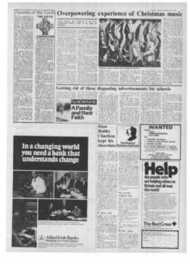Page 8, 7th December 1979
Page 8

Report an error
Noticed an error on this page?If you've noticed an error in this article please click here to report it.
Tags
Share
Related articles
Santa Claus Is Coming...
Behind Those Seasonal Greetings
How Christmas Gifts Are Brought To Many Lands
Now It's Time To Make Advent Really Mean Something Again
Will The Real Santa Claus Please Stand Up?
The enduring traditions of St. Nicholas
The Christmas period has spawned many odd traditions. Here Christopher House examines some of the more frivolous examples while (below) Geoffrey Humphry looks at the phenomenon of boy bishops.
IF YOU were a law abiding citizen of Windsor in the early nineteenth century who had wandered over the bridge crossing the Thames, on a December day, you would have been in danger of having your mouth filled with salt by a gang of unruly boys. And the bigbellied gentleman in the yellow silk stockings cavorted behind the troupe would have been King George himself, as pleased with the revels as when he found himself engaged in Conversations with oak trees, under. the misconception that they were the King of Prussia.
The blame for these goingson may be traced to old St. Nicholas, Bishop of Myra. Patron of Russia, sailors, captives, children and the townsmen of Bari. The good bishop lived in the early fourth century, and ever since his reputation for jollity has snowballed.
St. Nicholas has always been popular in Britain. Three hundred and seventy two parish churches are named after him. So enduring were the festivities surrounding his feast day on December 6, that the boys of Eton continued to waylay passers-by and offer them salt nearly 300 years after the reformation. Eton's founder, Henry VI was born on St. Nicholas's Day. Exactly why they chose this way to honour the saint was eventually forgotten. The whole thing came to an end under the virtuous disapprobation of Queen Caroline.
St. Nicholas pops up in the most unlikely places. Take Queen Caroline's husband (before he ditched her) King George IV. Ile was the "fat friend" when his regency buckishness had run to fat. But when he was still something of a young blood he found himself a little short of the ready in The Castle public house, just round the corner from the Herald offices (not that they or the Farringdon railway had then been thought on. So far it is a familiar enough story.
The regal gadabout got out of the cash-flow difficulty by popping his gold watch, in other words obtaining a loan on the security of personal property. Ever since, The Castle has incorporated three golden balls in its sign and been granted a licence to trade as a pawn shop as well as a pub.
Although St Bernardine invented the pawn shop, St Nicholas gave it the golden balls. They represent the three bags of gold he threw through the window of a man who had three daughters on his hands and no dowry to marry them off.
Over the centuries, St. Nicholas, after all a bona lide saint, has been treated rather cavalierly. It was had enough when his relics were stolen by Italian merchants and carted back to Bari where they have been honoured ever since. But to make him the patron saint of thieves was going too far.
That is exactly what happened though. In the rich cant vocabularly of the seventeenth century, thieves were known as 'St Nicholas's clerks'. A personal theory of mine (which Eric Patridge .would be able to sit in judgment upon if he still drew breath) concerns some well-known members of the underworld in the following century, the age of The Beggars Opera.
Followers of the mob after the close of day included the young and reckless, a section or whom indulged in the practice of throwing the heavy copper halfpennies of those times through the windows of houses. That was a recognised means of political dissent then. After a Budget, the Chancellor would have to close the shutters of his house: The parallel with St. Nick's coin-throwing exploits is obvious, and these glasssmashers were called 'nickers'. The etymology is so convincing that it is probably erroneous.
No nicker now survives, Today's halfpence would produce no more than a light tap on the thinnest window. Bottles are the favoured missile of the age and the mob is seldom looked on with easygoing good-humour. The cult of St. Nick as president of popular jollifications might have died out altogether had it not been for another royal supporter.
Albert, Prince Consort has left his mark on this country with memorials, public houses. and watch chains. No influence of his has bitten so deep as the importation of Santa Claus. The Christmas-tree imperative may deforest hundreds of acres annually, but Father Christmas makes his mark on the mind of every child as soon as he reaches the age of consciousness.
There is something a bit odd
about Santa Claus. He is meant to live at the North Pole. Ile drives reindeer with names like Donner and Blitzen. Ile conies down chimneys. He is the overt supporter or commercialism in a hundred department stores. All ill all, the old saint has gone. December 6 goes past without a mention of St. Nicholas, but a couple of weeks later it is Father Christmas who brings the toys.
Father Christmas is the product of the Protestant German world. He goes down a WO w in America. St. Nicholas goes N.sith the old customs from which we have fallen away. He stands for holly instead of Woolworth's paper streamers. For beef instead of turkeys. For beer and skittles and churchyard wakes and cakes and ale,
Best of all, St. Nicholas exists and Father Christmas does not.
blog comments powered by Disqus















